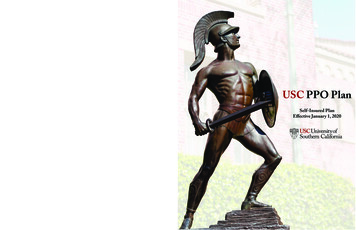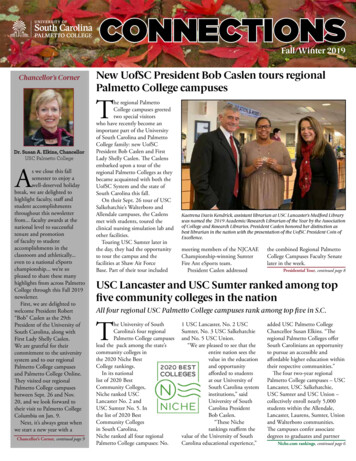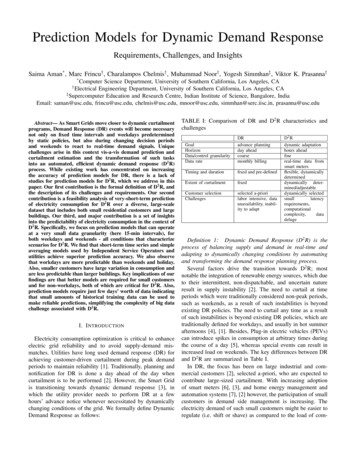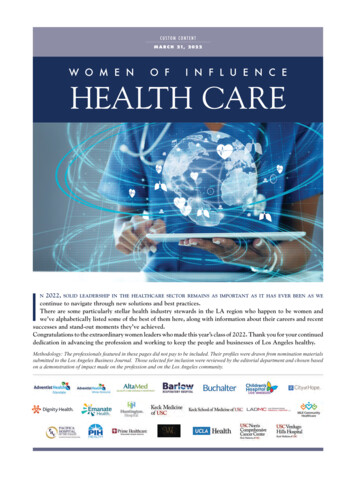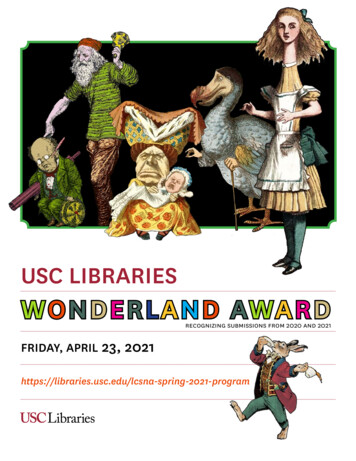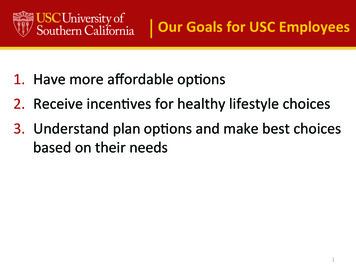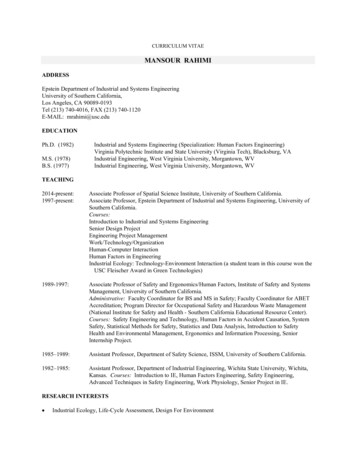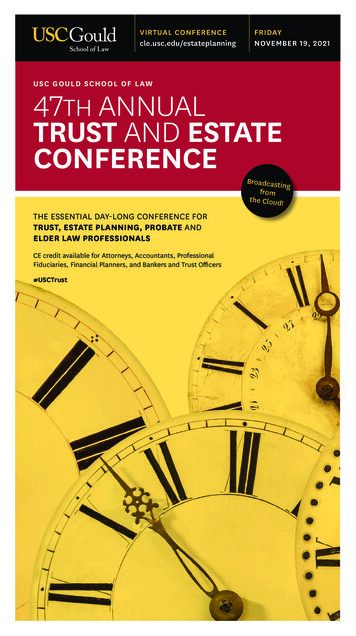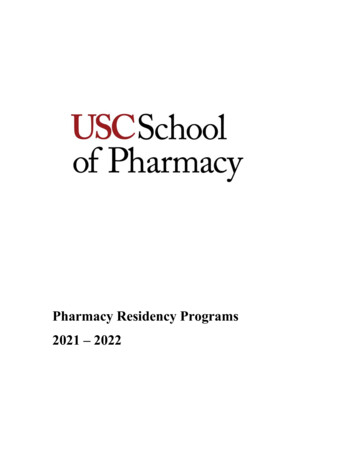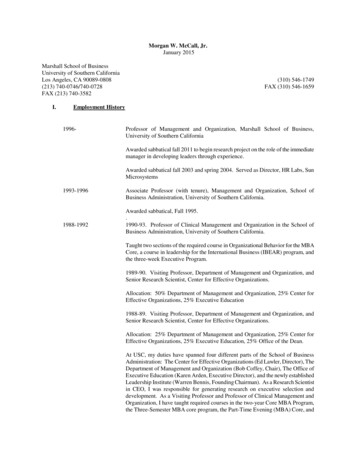
Transcription
Morgan W. McCall, Jr.January 2015Marshall School of BusinessUniversity of Southern CaliforniaLos Angeles, CA 90089-0808(213) 740-0746/740-0728FAX (213) 740-3582I.(310) 546-1749FAX (310) 546-1659Employment History1996-Professor of Management and Organization, Marshall School of Business,University of Southern CaliforniaAwarded sabbatical fall 2011 to begin research project on the role of the immediatemanager in developing leaders through experience.Awarded sabbatical fall 2003 and spring 2004. Served as Director, HR Labs, SunMicrosystems1993-19961988-1992Associate Professor (with tenure), Management and Organization, School ofBusiness Administration, University of Southern California.Awarded sabbatical, Fall 1995.1990-93. Professor of Clinical Management and Organization in the School ofBusiness Administration, University of Southern California.Taught two sections of the required course in Organizational Behavior for the MBACore, a course in leadership for the International Business (IBEAR) program, andthe three-week Executive Program.1989-90. Visiting Professor, Department of Management and Organization, andSenior Research Scientist, Center for Effective Organizations.Allocation: 50% Department of Management and Organization, 25% Center forEffective Organizations, 25% Executive Education1988-89. Visiting Professor, Department of Management and Organization, andSenior Research Scientist, Center for Effective Organizations.Allocation: 25% Department of Management and Organization, 25% Center forEffective Organizations, 25% Executive Education, 25% Office of the Dean.At USC, my duties have spanned four different parts of the School of BusinessAdministration: The Center for Effective Organizations (Ed Lawler, Director), TheDepartment of Management and Organization (Bob Coffey, Chair), The Office ofExecutive Education (Karen Arden, Executive Director), and the newly establishedLeadership Institute (Warren Bennis, Founding Chairman). As a Research Scientistin CEO, I was responsible for generating research on executive selection anddevelopment. As a Visiting Professor and Professor of Clinical Management andOrganization, I have taught required courses in the two-year Core MBA Program,the Three-Semester MBA core program, the Part-Time Evening (MBA) Core, and
the International Business Education and Research MBA program. Teachingresponsibilities included the design of a new MBA course in leadership (GSBA543) and redesign of the required course in organizational behavior (GSBA 532).I also have taught short segments in the Executive MBA program. WithExecutive Education, I teach in various executive programs, design and conductleadership and executive programs for corporate clients, and have served asFaculty Advisor to the executive program. I have been involved in the creation ofthe Leadership Institute, initiated by Warren Bennis and funded by a start-up grantfrom the Lord Foundation.1974 - 1988At the Center for Creative Leadership I held a variety of positions, includingResearch Psychologist, Behavioral Scientist/Project Manager, Director ofResearch, Director of Executive Leadership-Research Group, and SeniorBehavioral Scientist.At the Center for Creative Leadership, I began as a Research Psychologist (a titlelater changed to Behavioral Scientist) responsible for leadership research anddevelopment. I later held positions involving project, then program, and finallydivision management responsibility. As a project manager I ran a varietyresearch projects ranging from leading the team that developed the Looking Glassmanagement simulation to contract research projects with companies like IBM andPillsbury. As a program manager, I conceived of and later managed the ResearchSponsor Program, a collaborative research effort involving eight corporations andsix CCL professional staff. My responsibilities included recruiting sponsors,supervising the research effort, arranging conferences, and serving as sitemanager for two of the corporations. This program generated 200,000 annuallyin support of the research effort. As Director of Research, I was responsible forstrategy, structure, and budgeting for the division and for supervising doctoral andmasters level researchers (some of them managers) and support staff.In spite of increasing managerial responsibilities, I remained an individualcontributor, a fact reflected in the title Senior Behavioral Scientist.II.1975 - 1978Adjunct member of the Graduate faculty, University of North Carolina atGreensboro.1977Part-time lecturer, Graduate School of Business, Duke University.Education1974Ph.D., Cornell University, New York State School of Industrial and LaborRelations, Ithaca, New YorkMajor: Organizational BehaviorMinors: Personality & Social Psychology;Social Organization & Change1970B.S. (Cum Laude, with honors), Yale University, New Haven, ConnecticutMajor: Administrative Science
Morgan W. McCall, Jr.Page 3III.PublicationsA.Academic BooksMcCauley, C. D., & McCall, M. W., Jr. (Eds.) (2014). Using experience to develop leadershiptalent: how organizations leverage on-the-job development. San Francisco: Jossey-Bass(Society for Industrial and Organizational Psychology Professional Practice Series).McCall, M. W., Jr., & Hollenbeck, G. P. (2002). Developing global executives: the lessons ofinternational experience. Boston: Harvard Business School Press. (Portuguese translation,Artmed Editora Ltda., Brasil, 2002/3)Mobley, W. H, & McCall, M. W., Jr., (Eds.) (2001). Advances in Global Leadership, Volume II.Stamford, CT: JAI Press.McCall, M. W., Jr. (1998). High flyers: Developing the next generation of leaders.Boston: Harvard Business School Press. Nominated for the 1997 Financial Times/ BoozAllen & Hamilton Global Business Book Award. Winner of the 1998 Athena Award as thebest book on leadership and Best of Show. Published in Dutch by Thema, UitgeverijSchouten & Neliss (1998), in Thai by A.R Business Press, Bangkok (1999), and in Japaneseby President, Inc., Tokyo (2001).Galbraith, J.R., Lawler, E.E. III, Mohrman, S.A., Mohrman, A.M., McCall, M.W. Jr.,Cohen, S.G., & Ledford, G.E. Jr. (1993). Organizing for the future: The new logic formanaging complex organizations. San Francisco: Jossey-Bass.McCall, M. W., Jr., & Kaplan, R. E. (1990). Whatever it takes: The realities of managerialdecision making (Second edition). Englewood Cliffs, NJ: Prentice-Hall. (Originallypublished as Whatever it takes: Decision makers at work, Prentice-Hall, 1984.)McCall, M. W., Jr., Lombardo, M. M., & Morrison, A. M. (1988). The lessons of experience:How successful executives develop on the job (Issues in Organization and ManagementSeries). Lexington, MA: Lexington Books. (Winner of the 1988 "New Perspectives onExecutive Leadership Award," nominated for the George R. Terry Book Award by theAcademy of Management, chosen as an alternate selection of the MacMillan Executive BookClub, and selected for the audio cassette series, Fast Track, June 1989. It is in its 9thprinting.)Lindsey, E. H., Homes, V., & McCall, M. W., Jr. (1987).Greensboro, NC: Center for Creative Leadership.Key events in executives' lives.McCall, M. W., Jr., & Lombardo, M. M. (Eds.) (1978). Leadership: Where else can we go?Durham, NC: Duke University Press.B.TextbooksLombardo, M. M., McCall, M. W., Jr., & DeVries, D. L. (1989/1983). Looking Glass, Inc.:University edition. Greensboro, NC: Center for Creative Leadership. Originally published
Morgan W. McCall, Jr.Page 4by Scott, Foresman, Glenview, IL. Materials include administrator' s and student guides and20 behavioral in-baskets.B.Book ChaptersMcCall, M.W. Jr., & McCauley, C.D. (2014). Experience-driven leadership development:surveying the terrain. In C. McCauley & M. McCall (Eds.), Using Experience toDevelop Leadership Talent. San Francisco: Jossey-Bass (Society for Industrial andOrganizational Psychology Professional Practice Series), Chapter 1.McCauley, C.D. & McCall, M.W. Jr. (2014). Putting experience at the heart of leaderdevelopment: concluding thoughts. In C. McCauley & M. McCall (Eds.), UsingExperience to Develop Leadership Talent. San Francisco: Jossey-Bass (Society forIndustrial and Organizational Psychology Professional Practice Series), Chapter 18.McCall, M.W.,Jr, & McHenry, J.J. (2014). Catalytic converters: how exceptional bossesdevelop leaders. In C. McCauley & M. McCall (Eds.), Using Experience to DevelopLeadership Talent. San Francisco: Jossey-Bass (Society for Industrial andOrganizational Psychology Professional Practice Series), Chapter 17.McCall, M.W., Jr. (2013). A Quarter-Century and Counting: Getting Serious about UsingExperience to Develop Talent. In C. McCauley, D. DeRue, P. Yost, & S. Taylor(Eds.), Experience-Driven Leader Development: Models, Tools, Best Practices, andAdvice. San Francisco: Wiley. xix-xxi.McCall, M.W., Jr., & Hollenbeck, G.P. (2010). The not-so-secret sauce of the leadershipdevelopment recipe. In K. Bunker, D. Hall, & K. Kram (Eds.), ExtraordinaryLeadership: Addressing the Gaps in Senior Executive Development (San Francisco:Josey-Bass, Chapter7, 155-173)McCall, M.W., Jr., (2010). The experience conundrum. In N. Nohria & R. Khurana (eds),Handbook of Leadership Theory and Practice (Boston: Harvard Business Press, Chapter23, 679-707).McCall, M.W., Jr., (2009). Every strength a weakness and other caveats. In R.Kaiser (ed),The Perils of Accentuating the Positive (Tulsa, OK: Hogan Press, 41-56)McCall, M.W., Jr., (2009). Crafting a path toward mastery: Turning a personal leadershipdevelopment plan into something useful. In S. Allen (ed), The CALE LeadershipHandbook (Pinegowrie, South Africa: Centre for Applied Leadership Excellence, 177187).McCall, M.W., Jr., (2009). Getting development out of the little box at the end of the form. InP. Yost & M. Plunkett (eds.), Real time leadership development (West Sussex, UK:Wiley-Blackwell, vii-x).McCall, M.W., Jr., & Hollenbeck, G.P. (2007). Getting leader development right: competencenot competencies. In J. Conger & R. Riggio (eds), The Practice of Leadership (SanFrancisco: Jossey-Bass, 87-106).Hollenbeck, G. P. & McCall, M. W., Jr. (2003) Competence, not competencies: Making global
Morgan W. McCall, Jr.Page 5executive development work. In W. Mobley & P. Dorfman (eds), Advances in global leadership(Volume 3) (Oxford, England: JAI/Elsevier)Hollenbeck, G. P., & McCall, M. W., Jr. (1999). Leadership development: ContemporaryPractices. In A. Kraut & A. Korman (eds.), Evolving practices in human resourcemanagement: Responses to a changing world of work. San Francisco: Jossey-Bass.McCall, M. W., Jr., Mahoney, J., & Spreitzer, G. (1995). Identifying leadership potential in futureinternational executives. In D. Ready (ed.), In charge of change: Insights into nextgeneration organizations. Lexington, MA: International Consortium for ExecutiveDevelopment Research, 159-169.McCall, M. W., Jr. (1994). Early identification of global executives: Where to place your bets. InThe Human Resource Planning Society (ed.). HR' s role in business effectiveness:Different roads to a common destination. New York: The Human Resource PlanningSociety, 206-216.McCall, M. W., Jr. (1993). Developing leadership. In J. Galbraith, E. Lawler, III, S. Mohrman,A. Mohrman, M. McCall, Jr., S. Cohen, & G. Ledford, Jr. Organizing for the future:The new logic for managing complex organizations. San Francisco: Jossey-Bass. [Thisarticle is available from the Center for Effective Organizations, technical report G90-18.]McCall, M. W., Jr. & Bobko, P. (1990). Research methods in service of discovery. In M. D.Dunnette & L. M. Hough (Eds.), Handbook of Industrial and Organizational Psychology(2nd Edition, Volume 1). Palo Alto: Consulting Psychologists Press, 381-418.McCall, M. W., Jr. (1983). Leadership and the professional. In T. Connolly (Ed.), Scientists,Engineers and Organizations (pp. 328-345). Monterey, CA: Brooks/Cole. [Also publishedin Ralph Katz (ed.), Managing Professionals in Innovative Organizations: A Collection ofReadings (Cambridge, MA: Ballinger, 1988, 148-161).]Lombardo, M. M., & McCall, M. W., Jr. (1982). Leaders on line: Observations from a simulationof managerial work. In J. G. Hunt, U. Sekaran, & C. A. Schriesheim (Eds.), Leadership:Beyond Establishment Views (pp. 50-67). Carbondale, IL: University of Southern Illinois.McCall, M. W., Jr. (1979). Power, authority, and influence. In S. Kerr (Ed.), OrganizationalBehavior (pp. 185-206). Columbus, OH: Grid.Lombardo, M. M., & McCall, M. W., Jr. (1978). Leadership. In M. W. McCall, Jr. &M. M. Lombardo (eds.), Leadership: Where Else Can We Go? (pp. 1-12). Durham, NC:Duke University Press.McCall, M. W., Jr., & Lombardo, M. M. (1978). Where else can we go? In M. W. McCall, J., &M. M. Lombardo (eds.), Leadership: Where Else Can We Go? (pp. 151-165). Durham,NC: Duke University Press.McCall, M. W., Jr. (1977/1983). Leaders and leadership: Of substance and shadow. InJ. R. Hackman, E. E. Lawler III, & L. Porter (Eds.), Perspectives on Behavior inOrganizations (pp. 375-386). New York: McGraw-Hill.McCall, M. W., Jr. (1977). Making sense with nonsense: Helping frames of reference clash. InP. C. Nystrom & W. H. Starbuck (Eds.), Prescriptive Models of Organizations: North
Morgan W. McCall, Jr.Page 6Holland TIMS Studies in the Management Sciences (Vol. 5, pp. 111-123). Amsterdam:North Holland Publishing.D.Published ArticlesMcHenry, J.J., & McCall, M.W., Jr. (2014). Surviving and growing from international experience:The role great bosses play. People & Strategy, 37(3), 52-57.McCall, M.W., Jr. (2010) Recasting leadership development. Industrial and OrganizationalPsychology Perspectives on Science and Practice, (3)1,3-19.McCall, M.W., Jr. (2010) Peeling the onion—getting inside experience-based development.Industrial and Organizational Psychology Perspectives on Science and Practice, (3)1, 61-68.McCall, M.W., Jr., & Hollenbeck, G.P. (2008). Developing the expert leader. People &Strategy (formerly Human Resource Planning), 31(1), 20-28. (Winner of the HumanResource Planning Society’s 2008 Walker Award.)Ault, G., & McCall, M.W., Jr. (2008). The derailment conspiracy: when talented peoplederail. Focus on Surgical Education, 25(1), 23.McCall, M.W., Jr. (2008). Four common innovation mistakes. Harvard Management Update,13(5), 9-10.McCall, M.W., Jr., & Hollenbeck, G.P. (2007). Can leadership be taught: observations fromthe field. The Human Factor, 1(4), 24-29McCall, M.W., Jr., & Hollenbeck, G.P. (2007). Getting leadership development right.Leadership Excellence, February, 8-9.Hollenbeck, G. P., & McCall, M. W., Jr. (2006). Eight myths about developing globalexecutives. Pravartak, 1(2), 37-42. (Pune, India: National Insurance Academy).Hollenbeck, G.P., McCall, M.W., & Silzer, R. (2006). Leadership competency models.Leadership Quarterly, 17, 398-413.McCall, M. W., Jr. (2004) Leadership development through experience. Academy of ManagementExecutive, 18(3), 127-130. Reprinted in M. F. R. Kets de Vries & K. Korotev, Leadershipdevelopment (Cheltenham, UK: Edward Elgar, 2011).McCall, M. W., Jr. (March-April 2004) Taking the lead on innovation. Strategy & Innovation, 2(2), 1213.McCall, M. W., Jr., & Hollenbeck, G. P. (May/June 2002). Global fatalities: When internationalexecutives derail. Ivey Business Journal, 74-78.Hollenbeck, G. P., & McCall, M. W., Jr. (Winter 2001). What makes a successful global executive.Business Strategy Review, 12(4), 49-56.McCall, M. W., Jr., & Christensen, C. M. (2000). Getting the right stuff in the right place at theright time. Teaching Note N9-601-054. Boston: Harvard Business School.
Morgan W. McCall, Jr.Page 7Spreitzer, G., McCall, M. W., Jr., & Mahoney, J. (February 1997). Early identification ofinternational executive potential. Journal of Applied Psychology, 82(1), 6-29.(Portions of this work were excerpted in “Identifying future leaders: They are made, notborn.” Research Briefing in Harvard Business Review, November-December 1995)McCall, M. W., Jr. (Winter 1994). Identifying leadership potential in future internationalexecutives: Developing a concept. Consulting Psychology Journal, 46(1), 49-63.McCall, M. W., Jr. (January/February 1992). Executive development as a business strategy. TheJournal of Business Strategy, 13(1), 25-31. [To be reprinted in P. Lorange (ed), Thestrategic planning process as part of the series The international library of management.Hampshire, England: Dartmouth.] [Also reprinted in T. Sattelberger (ed.). Humanresource management im umbruch: Positionierung, potentiale, perspektiven. Wiesbaden:Gabler, 1996, 43-54.]McCall, M. W., Jr., & Clair, J. A. (March-April 1992). In transition from physician to manager-Part 1. Physician Executive: Journal of Management, 18(2), 3-9. Part 2 appeared inPhysician Executive: Journal of Management, 18(3), 15-19. [This article is also availablefrom the Center for Effective Organizations, technical report T90-2(164).] Chosen forreprinting by Administrative Ophthalmology, 1992.McCall, M. W., Jr., & Clair, J. A. (May-June 1990). Why physician managers fail (Part 1).Physician Executive: Journal of Management, 16(3), 6-10. Part 2 appeared in PhysicianExecutive: Journal of Management, 16(4), 8-12. [This article is also available from theCenter for Effective Organizations, technical report # T 89-14 (157).]McCall, M. W., Jr. (1989). Leadership: The secrets of management success. Physician Executive:Journal of Management, 15(6), 10-12. [Also published in Clinical Laboratory ManagementReview, March/April, 1990.]McCall, M. W., Jr. (1989). Captains outrageous. Across the Board, 26(10), 11-13.(Chosen for the NEWSTRACK Executive Tape Service, 1990.) [Reprinted in M. Syrett &C. Hogg (Eds.). Frontiers of leadership: An essential reader. Oxford: Basil Blackwell,1992, 123-127.]McCall, M. W., Jr., Lombardo, M. M., & Morrison, A. M. (1989). Great leaps in careerdevelopment. Across the Board, XXVI (3), 54-63. [Adapted and reprinted as "Careerleaps and bounds" in Executive Excellence, 9(1), 16-17, January 1992.]McCall, M. W., Jr. (1988). Developing executives through work experience [special issue].Human Resource Planning, 11 (1), 1-12. Selected by the Human Resources PlanningSociety as a "best practices" article in R. Levit & C. Gikakis (eds.), Shared wisdom: Bestpractices in development and succession planning (New York: the Human ResourcePlanning Society, 1994, 125-142).Lombardo, M. M., & McCall, M. W., Jr. (January 1984). The intolerable boss. PsychologyToday, pp. 45-48. [reprinted in the Dallas Morning Herald and the Reno Gazette-Journal.]McCall, M. W., Jr., & Lombardo, M. M. (February 1983). What makes a top executive?Psychology Today, pp. 26-31. [Also in (Fall 1983) The Best of Business, pp. 82-86, inWhetten, D. A., & Cameron, K. S., Developing Management Skills (Glenview, IL: Scott,Foresman, 1984, 14-20), and in (February 1986) Executive Success, pp. 9-12].
Morgan W. McCall, Jr.Page 8Lombardo, M. M., & McCall, M. W., Jr. (1983). Great truths that may not be . . . Managementhomilies: Do they stand up under examination? Management Review, 72 (7), 52-55.McCall, M. W., Jr., & Lombardo, M. M. (1982). Using simulation for research: Through theLooking Glass. Management Science, 28, 533-549.McCall, M. W., Jr. (1980). Conjecturing about creative leaders. Journal of Creative Behavior, 14,225-234. [Also in (1984/1990) W. E. Rosenback & R. L. Taylor (Eds.), ContemporaryIssues in Leadership. Boulder, CO: Westview Press. (One of only five articles in the firstedition of Contemporary Issues in Leadership to be chosen for the second edition.) Also in(1978) S. Gryskiewicz (Ed.), Creativity Week I Proceedings. Greensboro, NC: Center forCreative Leadership.]McCall, M. W., Jr. (1976). Leadership research: Choosing gods and devils on the run. Journal ofOccupational Psychology, 49, 139-153.McCall, M. W., Jr., & Lawler, E. E., III (1976). High school students' perceptions of work.Academy of Management Journal, 19, 17-24.McCall, M. W., Jr. (September 1975). Leadership is a ten letter word. Journal: The AmericanChamber of Commerce Executives, 17-19.E.Published Technical Reports1Hollenbeck, G. P., & McCall, M. W., Jr. (August 1997). Leadership Development: ContemporaryPractice (CEO publication G 97-9 (321)). Los Angeles: Center for Effective Organizations.(An abridged version of this report will be published in A. Kraut & A Korman (eds.), Newdirections for human resource management (San Francisco: Jossey-Bass).McCall, M. W., Jr., Spreitzer, G. M., & Mahoney, J. (1994). Identifying leadership potential infuture international executives: A learning resource guide (A final report on phase 2 of thisresearch project). Lexington, MA: International Consortium for Executive DevelopmentResearch.McCall, M. W., Jr. (1992). Identifying leadership potential in future internationalexecutives: Developing a concept (A final report on phase 1). Lexington, MA:International Consortium for Executive Development Research.McCall, M. W., Jr. (1990). Developing leadership: A look ahead (Technical Report# G 90-18). Los Angeles: Center for Effective Organizations.McCall, M. W., Jr., & Clair, J. A. (1990). In transit: From physician to manager (TechnicalReport # T 90-2 (164)). Los Angeles: Center for Effective Organizations.McCall, M. W., Jr., & Clair, J. A. (1989). Why physician managers fail (TechnicalReport # T 89-14 (157)). Los Angeles: Center for Effective Organizations.1The Center for Creative Leadership Technical Report Series is refereed.
Morgan W. McCall, Jr.Page 9McCall, M. W., Jr., Hutchison, E. T., & Homes, V. (1989). Using experience to develop managerialtalent: A professional's guide to on-the-job development (Technical Report G 89-8 (151)).Los Angeles: Center for Effective Organizations.McCall, M. W., Jr. (1988). Developing executives through work experiences (Technical ReportNo. 33). Greensboro, NC: Center for Creative Leadership.Lombardo, M. M., & McCall, M. W., Jr. (1984). Coping with an intolerable boss (Special Report).Greensboro, NC: Center for Creative Leadership.McCall, M. W., Jr., & Lombardo, M. M. (1983). Off the track: Why and how successfulexecutives get derailed (Technical Report No. 21). Greensboro, NC: Center for CreativeLeadership. (Also reprinted in Kurtz, H. J., & Stiefel, R. T. (Eds.) (1985). Laufbahn undlaufbehngestaltung: Englischsprachige arbeitsmaterialien fur life styling-trainer. Munchen:Academic.)McCall, M. W., Jr., Kaplan, R. E., & Gerlach, M. L. (1982). Caught in the act: Decision makersat work (Technical Report No. 20). Greensboro, NC: Center for Creative Leadership.Lombardo, M. M., & McCall, M. W., Jr. (1981). Leaders on line: Observations from a simulationof managerial work (Technical Report No. 18). Greensboro, NC: Center for CreativeLeadership.McCall, M. W., Jr. (1981).Leadership and the professional (Technical Report No. 17).Greensboro, NC: Center for Creative Leadership.McCall, M. W., Jr., & Segrist, C. A. (1980). In pursuit of the manager' s job (Technical ReportNo. 14). Greensboro, NC: Center for Creative Leadership.McCall, M. W., Jr. & Lombardo, M. M. (1979). Looking Glass, Inc.: The first three years(Technical Report No. 13). Greensboro, NC: Center for Creative Leadership.McCall, M. W., Jr., & Lombardo, M. M. (1979). Looking Glass, Inc.: An organizationalsimulation (Technical Report No. 12). Greensboro, NC: Center for Creative Leadership.McCall, M. W., Jr. (1978). Power, influence, and authority: The hazards of carrying a sword(Technical Report No. 10). Greensboro, NC: Center for Creative Leadership.McCall, M. W., Jr., Morrison, A. M., & Hannan, R. L. (1978). Studies of managerial work:Results and methods (Technical Report No. 9). Greensboro, NC: Center for CreativeLeadership.Morrison, A. M., McCall, M. W., Jr., & DeVries, D. L. (1978). Feedback to managers: Acomprehensive review of twenty-four instruments (Technical Report No. 8). Greensboro,NC: Center for Creative Leadership.McCall, M. W., Jr. (1978).Leadership as a design problem (Technical Report No. 5).Greensboro, NC: Center for Creative Leadership.McCall, M. W. Jr. & DeVries, D. L. (1978). Appraisal in context: Clashing with
Morgan W. McCall, Jr.Page 10organizational realities (Technical Report No. 3). Greensboro, NC: Center for CreativeLeadership.McCall, M. W., Jr. (1977). Leaders and leadership: Of substance and shadow (Technical ReportNo. 2). Greensboro, NC: Center for Creative Leadership.F.Published Book ReviewsMcCall, M. W., Jr. (1995). [Review of Leading change: Overcoming the ideology of comfort andthe tyranny of custom by James O' Toole]. Personnel Psychology, 48(4), 929-932.McCall, M. W., Jr. (1990). [Review of The Executive Effect: Concepts andMethods for Studying Top Managers by D. C. Hambrick (ed.)]. Industrial and LaborRelations Review, 44(1), 175-176.McCall, M. W., Jr. (1988). [Review of Real Managers by F. Luthans, R. M. Hodgetts, &S. A. Rosenkrantz]. Administrative Science Quarterly, 33 (3), 498-501.McCall, M. W., Jr. (1987). [Review of Bosses by J. Wall]. Academy of Management Review,12(3), 561-563.McCall, M. W., Jr. (1986). [Review of Leadership and Performance Beyond Expectations byB. M. Bass]. Human Resource Management, 25 (3), 481-484.McCall, M. W., Jr. (1982). [Review of Stogdill' s Handbook of Leadership by B. M.Bass]. Academy of Management Review, 7(4), 639-640.McCall, M. W., Jr. (1980). The troubled waters of leadership research [Review of Crosscurrents inLeadership by J. Hunt & L. Larson]. Contemporary Psychology, 25, 721-722.McCall, M. W., Jr. (1978). A sort of programmed learning "how to do it" for managers [Review ofHow to Develop Dynamic Leadership by M. V. Fiore & P. S. Strauss]. ContemporaryPsychology, 23, 359-360.McCall, M. W., Jr. (1976). Beware! Schemers disguised as leaders are after your castle! [Reviewof Leadership Development: Theory and Practice edited by R. N. Cassell &R. L. Heichberger]. Contemporary Psychology, 21, 122-123.McCall, M. W., Jr. (1976). Learning now what we thought we knew then [Review of The SocialPsychology of Work by M. Argyle]. Contemporary Psychology, 21, 428-429.G.Miscellaneous Publications and VideotapesMcCall, M. W. Jr. & Hutchison, E. T. (2008). “Hedge your Bets” (a card deck for high potentialdevelopment). Manhattan Beach, CA: Myths at Work.McCall, M. W., Jr., Spreitzer, G., & Mahoney, J. (1996). Prospector. Greensboro, NC: Centerfor Creative Leadership. (A validated tool for measuring international executive potential.)McCall, M. W., Jr. (May 1996). The care and feeding of high-potential managers. In Viewpoint(Series #8). Boston: International Consortium for Executive Development Research.
Morgan W. McCall, Jr.Page 11Reprinted in Spanish as Identificación y desarrollo de gerentes de alto potencial by AsuntosCIED, November 1997.McCall, M. W., Jr. One of several "management experts" in the 26-part series Takingthe lead: The management revolution! which appeared on PBS beginning in the Fall of1993. (Episodes 101, 105, 109, 112, 115, 116, 124, and 125.)Ruderman, M., McCauley, C., Ohlot, P., & McCall, M. (1993). DevelopmentalChallenge Profile: Learning from job experiences. Greensboro, NC: Center for CreativeLeadership. (A measure of the degree of developmental challenge present in job.)McCall, M. W., Jr. (1993). When bad bosses happen to good people. USC Business,Fall/Winter 1993, 34-35.Hutchison, E. T., & McCall, M. W., Jr. Executive edge: A leadership developmentinventory. Manhattan Beach, CA: Executive Education and Development, Inc.McCall, M. W., Jr. (1990). Why managers derail and some ideas for staying on track (videotape).Carson, CA: Senior Management Forum, Nissan Motor Corporation in U.S.A.McCall, M. W., Jr. (1989). What makes a physician executive successful: Lessons fromexperience(videotape). Tampa: American College of Physician Executives Videotapes.Morrison, A. M., & McCall, M. W., Jr. (April 1, 1984). Picking up cues from the boss. TheNew York Times, p. c15.McCall, M. W., Jr. (August 1981). The (partially) mythical gap between research andpractice. Issues & Observations, 1(3), pp. 4-5.McCall, M. W., Jr., Lombardo, M. M., & Rice, S. S. (1979). Looking Glass, Inc.: Norm tables.Greensboro, NC: Center for Creative Leadership.Devries, D. L., McCall, M. W., Jr., & Shullman, S. L. (1978). Performance appraisal workshop:briefing book. Greensboro, NC: Center for Creative Leadership.Lombardo, M. M., McCall, M. W., Jr., & DeVries, D. L. (1978). Looking Glass, Inc: Outsideinformation notebook. Greensboro, NC: Center for Creative Leadership.McCall, M. W., Jr. (1978). Looking Glass, Inc.: Commercial Glass Division. Greensboro, NC:Center for Creative Leadership.DeVries, D. L., Odom, J. V., & McCall, M. W., Jr. Selected references on performance appraisal:A topical bibliography. Greensboro, NC: Center for Creative Leadership, 1977.McCall, M. W., Jr. (April 1976). Of leadership and mythology. CCL, 3:2, p. 4McCall, M. W., Jr. (1974). The perceived informational environment of formal leaders.Unpublished doctoral dissertation, Cornell University, New York.IV.Selected Professional and Academic PresentationsMcCall, M. W., Jr. (October 2014). Ready now, ready later, never ready: Why succession planning
Morgan W. McCall, Jr.Page 12falls short on development (and what might be done about it). Invited keynote address, 10thAnnual SIOP Leading Edge Consortium (“Succession strategies: Building your leadershipbench”), Society for Industrial and Organizational Psychology, Chicago.McCall, M.W., Jr. (May 2014). Co-Chair & Panelist. Beyond 70-20-10 leadership development. PanelDiscussion at the 29th Annual Conference of the Society for Industrial and OrganizationalPsychology, Honolulu.McHenry, J.J., & McCall, M.W., Jr. (May 2014). Experience-driven leadership development. Invitedworkshop at the 29th Annual Conference of the Society for Industrial and Organizational Psychology,Honolulu.McCall, M.W., Jr. (May 2014). Presenter/ author, Learn about the SIOP professional practice series. PanelDiscussion at the 29th Annual Con
I also have taught short segments in the Executive MBA program. With Executive Education, I teach in various executive programs, design and conduct . Duke University. II. Education 1974 Ph.D., Cornell University, New York State School of Industrial and Labor . McCall, M. W., Jr., & Hollenbeck, G. P. (2002). Developing global executives: the .

